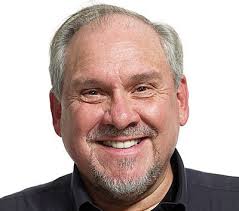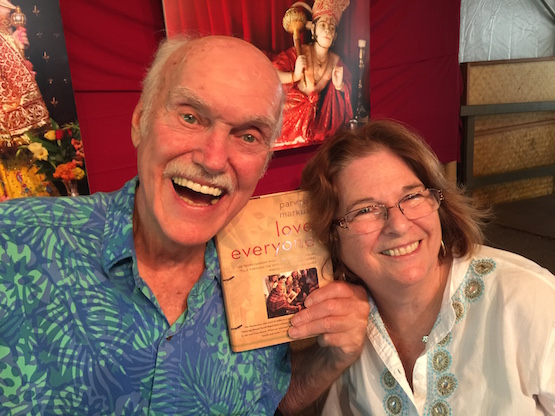Love Everyone: The Transcendent Wisdom of Neem Karoli Baba Told Through the Stories of the Westerners Whose Lives He Transformed.
Elephant editor-in-chief Waylon Lewis sits down (virtually) with…

Dr. Larry Brilliant [epidemiologist, author, senior advisor at the Skoll Foundation] and

Parvati Markus, author of Love Everyone [with Ram Dass to her left, above], to discuss their time as students of Maharajji and their path of service.
About the book:
A celebration of Neem Karoli Baba, one of the most influential spiritual leaders of our time, the divine guru who inspired and led a generation of seekers—including Ram Dass, Daniel Goleman, and Larry Brilliant—on life-changing journeys that have ultimately transformed our world.
In 1967, Baba Ram Dass—former American Harvard professor Richard Alpert—left India to share stories of his mysterious guru, Neem Karoli Baba, known as Maharajji. Introducing idealistic Western youth to the possibilities inherent in spiritual development, Ram Dass inspired a generation to turn on and tune in to a reality far different from the one they had known.
From the spring of 1970 until Maharajji died on September 11, 1973, several hundred Westerners had his darshan (in Hinduism, the beholding of a deity, revered person, or sacred object). Those who saw him formed the Maharajji satsang—fellow travelers on the path. Love Everyone tells the stories of those who heard the siren call of the East and followed it to the foothills of the Himalayas. The ways they were called to make the journey, their experiences along the way, and their meeting with Maharajji form the core of this multicultural adventure in shifting consciousness.
The contributors share their recollections of Maharajji and how his wisdom shaped their lives. All have attempted to follow Maharajji’s basic teaching, his seemingly simple directives: Love everyone, feed everyone, and remember God. All have found their own way to be of service in the world and, in so doing, have collectively touched the hearts and souls of countless others.
To read the book, get it here [boycott Amazon!].
~
Waylon Lewis, founding Editor-in-Chief of Elephant Journal: Hey all! So we’ve done many, many interviews in this sort of old-fashioned typing way…I then edit and post the transcript.
Larry Brilliant: Great. Eradicating smallpox was easier!
Waylon: Technology makes everything simpler, I thought! So a little context with elephant, in terms of who you two are talking to: we’ve been around for 13 years, now. We’re based in Boulder, with staff all over the world. We reached 16 million unique visitors, have won #1 in US twice on twitter, have approx 3 million facebook fans on 70+ pages.
Our mission is simple: to be of benefit, and have some fun doing so.
Parvati Markus: I have read many of elephant journal’s articles!
Brilliant: Happy to be part of your sweet world
WL: It’s my honor! Finally, we have a longstanding interview series, Walk the Talk Show, which this will be a part of, that has hosted Sharon Salzberg, countless yogis, technology and advertising folks…your friend Krishna Das many times. Seane Corn, Dr. Andrew Weil, Arianna Huffington, Michael Pollan, Alice Walker, Dr. Deepak Chopra, John Perkins, Paul Hawken, Ken Wilber, Robert Thurman, Richard Freeman, Byron Katie, Bill McKibben etc etc
Finally finally, I grew up in Trungpa Rinpoche’s community, worked at Shambhala Publications in college (worked with [Daniel] Goleman distantly, many others) and am a Buddhist.
LB: Quite a collection in your series! Looks like fun.
~
Waylon Lewis: I am honored to be here today with Dr. Larry Brilliant [bio above] and Parvati Markus, to discuss Parvati’s new book, Love Everyone. Parvati, for those who don’t know Neem Karoli Baba, who was he, in layman’s terms?
Parvati Markus: Not such a simple question. Neem Karoli Baba, or Maharajji, as we knew him, was what we would call a siddha, a perfected one, a fully enlightened spiritual master.
Or. simply a bundle of love wrapped in a plaid blanket.
WL: Aw. Larry, how did you first meet…Maharajji?
Larry Brilliant: I would have been much too dimwitted to have made it there myself…My wife (now 46 years since we’ve been married; 50+ that we’ve known each other) dragged me kicking and screaming.
WL: Well, you were smart enough to love her. We blokes have to find smart folks to love.
LB: Amen, Buddha bro.
WL: So what was it like first meeting Maharajji? Where was it? Can you describe the scene, and who you were at the time, or what you were up to?
LB: We were both part of the Hog Farm commune. We started in San Francisco as part of a movie caravan, Warner Bros. hired me to be an extra, to play the real life part of a hippie doctor for rock bands like The Grateful Dead, and do rock doc stuff.
WL: They noticed you somehow because of some sad-sounding event on Alcatraz.
LB: Yes, it was a great event, though, not sad. I helped deliver a baby on Alcatraz named Wokova.
LB: We were both “on the bus” and traveled from SF to DC, switched buses, drove to Kathmandu, we were the ones with blue jeans while Parvati and Ram Dass were the angels in white…
WL: Oh! You met Parvati then?
LB: I think I met Parvati at Kumar Art Gallery in Delhi, yes P?
PM: I don’t think so. I know I met Girija in Nainital. I left before you arrived.
LB: We hippies were with Wavy Gravy when we met the Satsang, I thought Parvati was there.
LB: There was a sweet melding of the tribes when the hog farm met the Satsang in Delhi but we headed from there to Nepal.
WL: Sounds like a rich time.
PM: I always say it’s worth being old now to have been young then.
I came to Maharajji because of Ram Dass. I met Ram Dass in 1969, and spent the summer at his father’s place in New Hampshire.
WL: And you helped edit a “little” book called Be Here Now, I hear? That’s a Dharma transmission right there.
PM: Yes indeed… the first book I ever worked on.
Love Everyone feels like full circle.
WL: Aw, wow. I got to interview Ram Dass a few years ago—a real honor, and delight, of course.
PM: We saw Ram Dass glowing, and we wanted what he had gotten…from the source!
WL: So Love Everyone tells the story of Maharajji through yourself, and his other students? Given the tumult of that time, and this time—violence, environmental devastation, confusion—what drew you to Maharajji, among all teachers you could have connected to?
PM: Love Everyone is a compilation of over 70 interviews I did with the Westerners who found their way to Maharajji in India, set in the chronological context of the times.
WL: So, when you met him, what did you actually do? Did you meditate, or what did he have you do? What was the path he set you upon? For Larry, it sounds like service was a great part of the path. Was there formal spiritual practice?
Larry: Maharajji was very strict about one kind of yoga. We called it the 5 Limbed Yoga, but it is a secret. Don’t tell anyone what the 5 Limbs were: eating, walking about, gossiping, sitting, sleeping.
WL: I won’t tell anyone, I promise.
PM: No required anything. He gave no lectures. He didn’t teach meditation. Many of us took Vipassana courses while in India, but if you meditated in front of Maharajji, he would hit you with a banana.
LB: Or, an apple.
PM: You forgot drinking tea, Larry.
LB: It is true I forgot the tea—I was trying to keep it a secret.
WL: I hope it was a ripe banana. Soft. So…would he basically try to wake you up, pop you out of fixed thinking?
Parvati: [Maharajji’s] main teachings were simple words, just hard to put into practice: love everyone, serve everyone, remember God, and tell the truth. And always, sub ek.
It’s all one.
Christ and Hanuman are one. God, guru, and self are one.
WL: So, did he just guide by example, if not technique or formal practice? Did you learn just by being around him?
LB: It was different for each person.
PM: Just being in his physical presence, just sitting in that extraordinary love, was enough to change you.
WL: Wow. For those elephant readers, in 2015, who have never been around such a being…it might sound unreal. There’s a lot of cynicism around spirituality, given how many spiritual charlatans selling something there have been.
But you all were open to him and his teaching, or being, it sounds like. Open vessels, instead of close-minded.
Parvati: It’s important to realize that all the people in the book were skeptical Westerners, just like your readers. We weren’t Indians with generations of guru worship in our lineage.
WL: That’s interesting—and heartening to hear.
LB: So true, Parvati, I was more cynical than skeptical even. I think one of the most wonderful things about Parvati’s book is the rainbow of human experiences of the people who trekked, bussed, flew to see Maharajji.
How the skepticism and cynicism and agnosticism and political ideology all melted in the face of that wonderful being, Maharajji.
Waylon: So this book is, in a way, an offering to all of us who missed the boat, or bus as it were. A way for us to look over your shoulders and experience that path from cynicism to melting.
PM: One of my favorite stories involves Larry hearing Maharajji say something that another person heard completely differently. And we love that the “teachings” we received were so individual. But he let us know, in one way or another, that he knew everything about us. And still loved us!
LB: You know, Waylon, the Buddhist expression of “near enemies”: how from the outside you can’t tell whether the person you are watching is a realized being, completely equanimous or a jackass who does not give a damn about anything. Equanimity and indifference are near enemies. Maharajji would not give a didactic lecture about that.
But being with him, you just knew.
PM: You can feel the difference when sitting in front of someone like Maharajji.
WL: And it’s not just some kind of groupthink? As you said, everyone had their own relationship and experience of his presence and teachings?
PM: He was so clear, all the way through. No ego, no hindrances.
And we were never a group of groupthinkers. People poked and prodded, tested in their own ways.
WL: I bet. A bunch of wild and independent folks?
So, again from an ignorant point of view (mine), where or how did Maharajji come to being? Was he trained as a child by a guru? What spiritual lineage, if any, did he represent?
PM: No one knew. And no one cared. We knew almost nothing about him until after his death, when we found out he had been married (around the age of 10) and had a wife and kids. He still managed to perform all his duties as the head person in his village, while performing austerities and later being the spiritual master.
He was associated with the Hindu monkey god, Hanuman.
WL: So, what did he ask you all to do? How did he ask you to serve the world? What was the point of this spiritual path—to attain realization, or to serve—or both in some way?
At elephant we’re passionate about meditation, and service—both.
LB: Like Parvati said, when I sat in front of him and meditated, he threw apples at me and wagged his finger, and told me that while Dhyana was so good, it was a tool to be used to strengthen the work he wanted me to do. He told me to go to work for the World Health Organization (WHO) to help eradicate smallpox. And to do that as Karma Yoga—Nishkam Karma Yoga—because God was going to help make the suffering of smallpox become eradicated, without personal gain, without attachment to results.
PM: He was clearly in favor of service. Hanuman served Ram. Ram Dass means servant of Ram.
WL: Karma Yoga, for those who don’t know—is service to others as spiritual path.
LB: It is very similar to Tikkun Olam in Judaism.
WL: Yes! We did an article on that [linked above]. Healing the world?
LB: Yes. Eradicating smallpox to me was part of healing the world.
PM: I had been Ram Dass’s secretary in New Hampshire during the summer of ’69. When I got to Maharajji in 1971, he said: you used to be Ram Dass’s secretary, now you’re mine. And in English he would call me “private secretary.” So my service has been through working on spiritual books.
WL: Well thank you for that service. We here at elephant look upon editors with the highest esteem, since that’s what we try to do.
PM: Why thank you. That was one of the things I loved about doing all those interviews, was finding out how the seeds Maharajji had planted in us had grown into so many different ways to serve.
WL: It’s fascinating, and fun to read. So—a question I ask of many spiritual teachers in our Walk the Talk Show video series—is, how do we be happy: is it through seva, or through self-concern? ?
Seva seems to be at the root of what Maharajji inspired and taught.
LB: It is truly in giving that we receive. That’s not propaganda.
PM: Maharajji did nothing but give love.
Waylon: Did [Larry’s] path in working to eradicate smallbox, and help those with polio or blindness—did that help make you truly happy?
LB: Several of us from Maharajji’s Satsang started the Seva Foundation, which has given back sight to four million blind.
That makes us very, very, very, very happy.
WL: Wow. That must fill you with so much joy.
And Parvati, that love he inspired, it wasn’t a selfish love, it was a love to be given to or shared with others? Is that how all of us can learn to be happy in our lives—to give?
PM: Yes, and to try to live up to his injunction to love everyone, serve everyone, and remember God.
When we are walking that path, it is indeed a happy one.
Waylon: Can Love—in the face of terrorism, war, inequality, so much suffering, animal suffering, climate change…can Love really handle all our challenges? Is Love enough?
LB: If terrorism is the virus, the disease…love is the vaccine, the antidote.
WL: Yes. As MLK Jr. said, and he should know—only love can defeat hate. Hate cannot defeat hate.
PM: And it’s not a sloppy sentimental love, just a recognition that we all carry a spark of the divine, and even if we don’t all act humanely, we are all one humanity.
WL: Thank you! Such an honor! Inspiring. Thank you both for your time and love.
PM: Wonderful. Thank you, Waylon. Nice to “meet” you.
LB: So much love to you both.
~
About the book:
A celebration of one of the most influential spiritual leaders of our time: Neem Karoli Baba, the enlightened guru who inspired a generation of seekers—including Ram Dass, Daniel Goleman, and Larry Brilliant—on life-altering journeys that helped change the world.
In 1967, Ram Dass returned to the West from India and spread the teachings of his mysterious guru, Neem Karoli Baba, better known as Maharajji. Ram Dass’s words about Maharajji’s life-affirming wisdom resonated with a youth culture that had grown disillusioned with the violence, civil discord, and crude materialism of modern civilization. Hundreds of Westerners traveled to India and experienced Maharajji’s extraordinary presence directly until his death in 1973. His simple directives—love everyone, feed everyone, and remember God—opened their hearts and awakened their souls.
What these followers brought back to the West has since changed the landscape of everyday life. Meditation is now mainstream; yoga studios are in every town; and mindfulness is practiced in elementary schools and board-rooms everywhere, from Silicon Valley to Capitol Hill. A stirring piece of history, Love Everyone brings these stories to life, sharing for the first time the inspiring tales of the men and women who followed the siren call of the East to the foothills of the Himalayas, then returned to forever reshape the world.
A compelling and inspiring tribute to Maharajji from the Western men and women who knew him best, Love Everyone is a profound teaching on the power of love, as lasting and transformative as the truth, wisdom, and bliss of Maharajji.
To read the book, get it here [boycott Amazon!].







Read 0 comments and reply